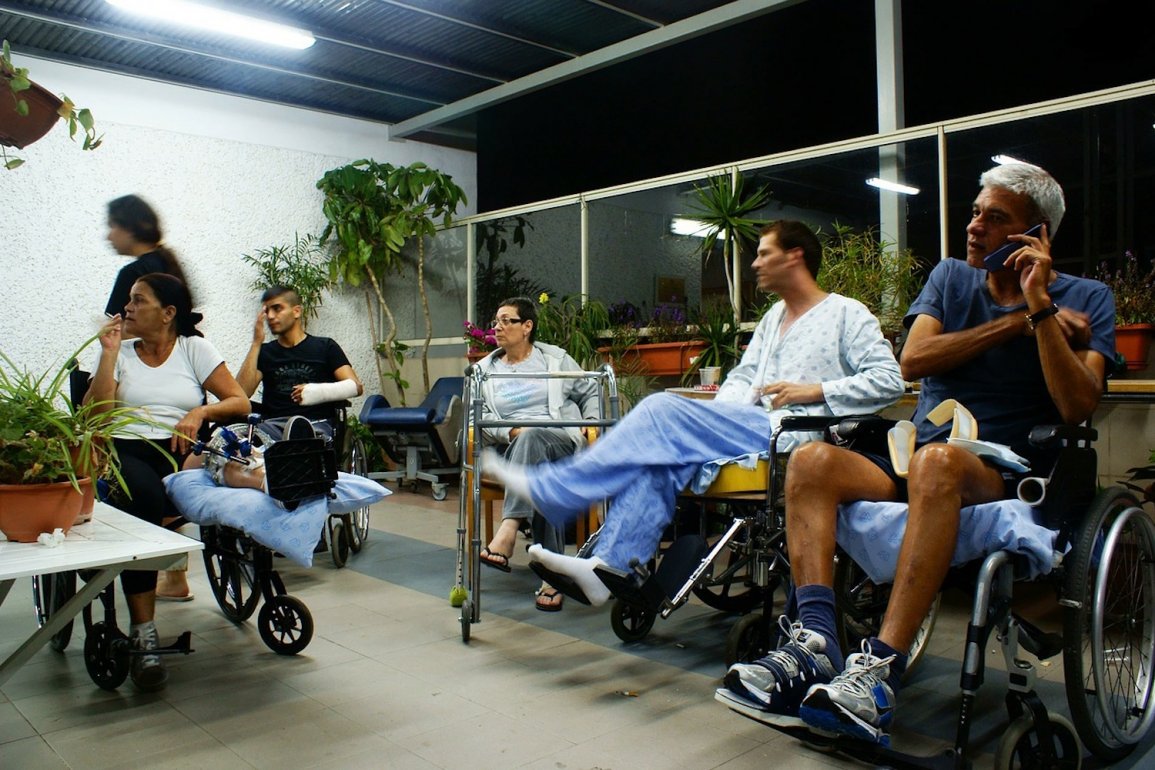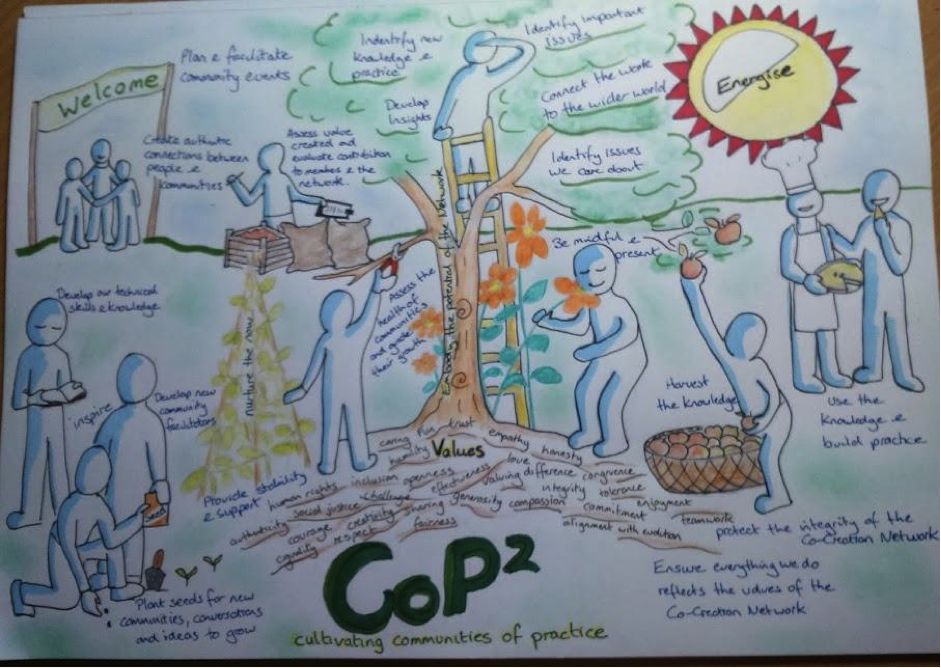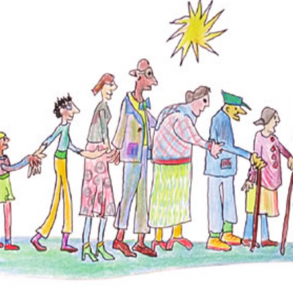By Jane Pightling for Enlivening Edge Magazine
The image is the domain statement of the Community of Practice of Facilitators in the Co-Creation Network of Communities of Practice. They chose to develop a visual statement rather than the more traditional written one.
I remember at a meeting, talking to someone working to establish a Teal organisation who told me that the NHS could never be Teal. The NHS is a long way from Teal, for sure. The NHS as a governmental entity is formed of many different organisations. Right now it’s probably more of a rainbow than any particular colour, in terms of the developmental stages of its units.
Even so, the NHS and the services it incorporates have made many big changes previously. For example, I was part of the alliance between health and social care staff, families, and service users that worked to move mental health care out of the asylums and into communities. I have worked with some amazing people and I have seen them do incredible things. Maybe they can evolve a Teal NHS; I think so, and this is why.
The Current NHS
Customarily, particular NHS services have been keen to police and protect their own borders, responsibilities, and resources. In the worst cases, people are bounced between different services, and struggle to find their way in a complex web of providers and eligibility criteria. Sometimes they fall in-between services and their needs go unmet or they just give up.
For example, when I was pregnant I had pregnancy-related carpal tunnel and needed a wrist splint. I was told by the physiotherapist I saw at my local primary care clinic that she couldn’t provide it to me, as her budget didn’t cover pregnant women. She advised I should travel into the city to the acute hospital maternity unit and see the physio there. I gave up and bought one via the internet.
Institutional Context of the Co-Creation Network of Communities of Practice
I have been working for the past year with a group of NHS clinicians, academics, service users, and staff from charitable and private industry to establish what we call the Co-Creation Network which encompasses a variety of “Communities of Practice” committed to making improvements in the health and social care system.
The Teal characteristic of evolutionary purpose is evident in that these Communities are about making improvements partly by breaking down the traditional boundaries of health and social care services, and encouraging/implementing a community-encompassing approach.
The Network is sponsored by two regional NHS bodies: Yorkshire & Humber Leadership Academy and Yorkshire & Humber Academic Health Science Network. Both regional bodies recognise that the challenges faced by the health and social care system require something very different. Both bodies have struggled to hold the space for this Network and the different approach it takes, against the usual system demands for performance management to justify any investment and direct activity.
Communities of Practice are a voluntary, not delegated endeavour. Some participants are given leave to attend meetings and events in worktime, but most CoP activity is done in members’ own time. Thus, membership in a Community of Practice requires great passion and personal motivation.
How the Communities of Practice Operate
Each CoP is people working together to co-create new knowledge and practice in an aspect of their own field. Communities are varied, focusing on whatever their members see as important. For example, Communities of Practice have been established to consider Sepsis, Medication Safety, and Creating Caring Cultures.
The Sepsis CoP is working on awareness-raising techniques to address an issue that people have not been well aware of previously. The NHS system has given them implicit permission by tasking staff or organisations to reduce sepsis incidents, but has not given directives on how to do this. So the CoP has the freedom to develop and implement some “How’s.”
You might be wondering, how do new “ways” get authorized to be implemented and put into practice in various settings? In some cases, the system has not given permission (versus the implied permission re Sepsis concerns) and the CoP may be challenging received wisdom and practice.
Some CoP’s have been formed with the express intention of doing such challenging, as they strongly believe that current practice is not good enough. CoP’s looking at changing the traditional relationship between professionals and patients are often in this position. Part of their learning is how to identify and influence key stakeholders to co-create a new approach.
The Communities of Practice are courageously pursuing new knowledge and new practices that they believe can bring real value to the services they provide.
In an acute hospital, a Community of Practice has introduced mindfulness practices for staff and elderly patients. It is reporting a real cultural shift in the ward environment, and a huge impact on patient safety, with fall rates hugely reduced.
This Community is now turning its attention to how it might extend this ethos of care out into the community to involve everyone who might provide support to their patients.
A Community of Practice was formed by a group of staff developing a new role in primary care to connect services and provide better care for older people with complex health needs. In the UK, locally-based clinics provide access to doctors, nurses and health care support staff as the first point of contact − and principal point of continuing-care contact − for services dealing with ongoing health conditions.
It was noted that an older person with several long term conditions such as heart disease, diabetes, and dementia would be in contact with their local primary care doctor and nurses, but would also have links with a huge variety of other health and care organisations including specialist medical services provided at outpatient clinics in acute hospitals, specialist community-based teams such as mental health and dementia care, specialist home care services from a physiotherapist or occupational therapist, nursing visits from charities, as well as support and care workers from not-for-profit care companies.
This Community of Practice is noticing early signs of expected success in reduced admissions to hospital for this patient group as all those services work better together to keep the person safe and well at home.
There is also a vast array of other benefits from this CoP’s connecting of services. They include improved understanding and appreciation between different government-provided health and social care services, good relationships between different locally-based clinics, authentic connections between statutory (government-provided) services and community assets and resources, and a commitment from all elements of the whole system to improve the support provided to these elderly members of their local community.
Next-Stage Challenges Faced and Dealt with in CoP’s
I believe my experience provides one bit of clear evidence that the three Teal principles of self-management, evolutionary purpose, and wholeness have been readily adopted as core principles by some NHS staff and those working with them. I am sure there are other examples too. The Communities of Practice established as part of the Co-Creation Network adopted these principles despite the fact that they were challenging and difficult at first.
Self-Management
Communities of Practice are self-managing by definition. They set their own agenda, organise themselves, and also decide what learning they will pursue and how they will use this knowledge.
This was a shock to many NHS staff involved, and it was difficult not to seek permission and direction from elsewhere. Many of us experienced confusion at first. “What is it we are supposed to do?”
Communities moved swiftly from confusion to feelings of liberation and then action. Members gained confidence, established relationships, defined their shared agenda, and organised meetings and “learning expeditions” — our title for the work to answer the questions we have set ourselves.
Wholeness
One of the most unifying and important aspects of the Co-Creation Network is the way it supports wholeness. The Network adopted mindfulness practices to help stressed, overstretched members be fully present in their Communities of Practice.
The opportunity to make authentic connections and pursue work that they identified themselves as important was cathartic. I think it may have even persuaded some members, who were disillusioned and damaged by their working environments, to stay within the NHS and work towards change.
“This work gave me space to connect with that passion again and start to explore what could be possible. Through learning about CoP’s I could see that I wouldn’t make it to the top (of the mountain) on my own, but I could take others with me and we could support each other on our difficult journey. And that the journey itself would make us stronger, through sharing and learning together.” Community of Practice Member
Evolutionary Purpose
Perhaps most inspirational is the evolutionary purpose evident in the Network and its Communities of Practice. Free to pursue their own agendas, Communities of Practice have been established to consider pharmacy, mental health and childbirth, work with older people, the role of mindfulness in healthcare, Innovation, Musculoskeletal Practice, and many other areas.
However, it’s not the rich variety of learning and practice being developed that I find so significant; it’s the way this is being done, described in this article. Like for Buurtzorg in the Netherlands, the results can already be termed “outrageous”. (Laloux, 2014 Reinventing Organisations, Chapter 2.2 Outrageous Results paragraph 1)
“There was an absence or at least a much reduced sense of fear about “doing it wrong;” this felt different from much of my previous experience of the NHS.” Community of Practice Consultant
Reinventing the NHS as Teal
Contrary to my own typical experience of “falling through the cracks” of the system, now more new Communities of Practice are focusing on working across traditional service boundaries, and often exploring a geographically-defined approach which reflects the community or neighbourhood experience of the people accessing their services. These Communities of Practice seem to have found a real evolutionary purpose.
They are working towards breaking down traditional NHS boundaries and developing new ways of supporting health and well-being in an environment where it is clear that health and social care needs to radically reinvent itself.
Maybe the person I met was right after all. The NHS as it is now cannot be a Teal organisation. But the NHS that will be, must evolve to become a Teal organisation.
 Jane Pightling worked in the statutory sector for 25 years in the civil service, probation service, local authorities and NHS before stepping out earlier this year. She worked as a front line care provider, operational manager, programme manager, and improvement scientist before discovering the joy of organisational development and evolutionary approaches.She is currently enjoying her experience of working back into the system from a more autonomous position. [email protected] https://uk.linkedin.com/in/janepightling
Jane Pightling worked in the statutory sector for 25 years in the civil service, probation service, local authorities and NHS before stepping out earlier this year. She worked as a front line care provider, operational manager, programme manager, and improvement scientist before discovering the joy of organisational development and evolutionary approaches.She is currently enjoying her experience of working back into the system from a more autonomous position. [email protected] https://uk.linkedin.com/in/janepightling
Featured






Hi Jane,
It’s great to hear about what you’re up to with communities of practice in the NHS.
The comment by Jos de Blok of Buurtzorg that up to 50% of all the care done in Dutch hospitals could be done using a Buurtzorg-style approach gives me hope that a shift to Teal might be more feasible than we might at first think: https://enliveningedge.org/news/uks-royal-college-of-nursing-reiterates-its-support-for-bureaucracy-free-buurtzorg-model/
Plus the interest of the Royal College of Nurses and the Buurtzorg-inspired pilots that seem to be emerging in London and Scotland: https://enliveningedge.org/field-reports/how-to-build-bureaucracy-free-health-services-in-the-uk-learning-from-buurtzorg/
Though there is, of course, a question about whether Buurtzorg-style innovations can emerge from a plan developed partly by senior managers within the NHS…!
I’m also intrigued about whether you are involved with Helen Bevan and the NHS’s School for Health and Care Radicals…? This seems to be the most public face of empowering staff as change agents within the NHS.
I do hope so! (It might be good if patients could find out about your communities too – perhaps on HealthUnlocked?).
I think Helen’s put her finger on the issue when she says that there needs to be a shift from ‘change programmes’ to ‘change platforms’ in the NHS, if ongoing, involving change is ever to become a new norm.
I actually participated yesterday as a kind of expert witness in an NHS Citizen’s Jury in Stoke-on-Trent that was part of the NHS Citizen process – very much an example of the ‘change platform’ approach to transforming the NHS, which I hope will grow.
The fleet of oil-tankers slowly turns… 😉
Hi Matthew,
There’s a lot of interest in Buurtzorg all over the UK I think, in pockets. Maybe this is something that starts small everywhere it can and grows. I’m thinking that the NHS is less of a single organization and more of a system. I’m wondering if thinking of it in this way then allows us to easily include social care and other health providers, service users, carers and their local communities. Maybe this more locally focused thinking fits better with teal aspirations and we deal with the more governmental aspects we think of as ” the NHS” in the same way that other businesses might relate to health and safety or tax law?
Our Communities of Practice already welcome service users, carers and anyone else interested in working to improve. Some of our Communities of Practice are service user founded and facilitated. If you are interested in joining a community or setting one up please dont hesitate to contact us http://ia-cocreationnetwork.com/ membership, use of the website etc and support to set up and grow your commuity is all free.
Many of our members have attended the Health Care Radicals and other events provided by Helen Bevan and her team. We would view the Co-Creation Network as one of the change platforms she was referring to in her webinar. It’s a real concern that the capacity of this service is likely to be much reduced in the very near future as cost saving reorganisations are introduced. The Citizens Jury work sounds really interesting.
Maybe you could help us reach more people via Health Unlocked, it would be great to hear more of your thoughts.